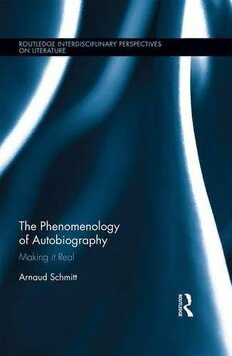
The Phenomenology of Autobiography: Making it Real PDF
Preview The Phenomenology of Autobiography: Making it Real
The Phenomenology of Autobiography Taking a fresh look at the state of autobiography as a genre, The Phenomenology of Autobiography: Making It Real takes a deep dive into the experience of the reader. Dr. Schmitt argues that current trends in the field of life writing have taken the focus away from the text and the initial purpose of autobiography as a means for the author to com municate with a reader and narrate an experience. The study puts auto biography back into a communicational context, and putting forth the notion that one of the reasons why life writing can so often be aestheti cally unsatisfactory, or difficult to distinguish from novels, is because it should not be considered as a literary genre but as a modality with radi cally different rules and means of evaluation. In other words, not only is autobiography radically different from fiction due to its referentiality, but, first and foremost, it should be read differently. Dr. Arnaud Schmitt is a Senior Lecturer and Professor at the University of Bordeaux. Routledge Interdisciplinary Perspectives on Literature For a full list of titles in this series, please visit www.routledge.com. 67 Landscape, Seascape, and the Eco-Spatial Imagination Edited by Simon C. Estok, I-Chun Wang, and Jonathan White 68 Auto/Biography across the Americas Transnational Themes in Life Writing Edited by Ricia Anne Chansky 69 Ecocriticism and Indigenous Studies Conversations from Earth to Cosmos Edited by Joni Adamson and Salma Monani 70 Representations of Anne Frank in American Literature In Different Rooms Rachael McLennan 71 Hospitality in American Literature and Culture Spaces, Bodies, Borders Ana Mª Manzanas Calvo and Jesús Benito Sánchez 72 Transcultural Poetics and the Concept of the Poet From Philip Sidney to T.S. Eliot Ranjan Ghosh 73 Steampunk and Nineteenth-Century Digital Humanities Literary Retrofuturisms, Media Archaeologies, Alternate Histories Roger Whitson 74 Food and Foodways in African Narratives Community, Culture, and Heritage Jonathan Bishop Highfield 75 The Phenomenology of Autobiography Making it Real Arnaud Schmitt The Phenomenology of Autobiography Making It Real Arnaud Schmitt First published 2017 by Routledge 711 Third Avenue, New York, NY 10017 and by Routledge 2 Park Square, Milton Park, Abingdon, Oxon OX14 4RN Routledge is an imprint of the Taylor & Francis Group, an informa business © 2017 Taylor & Francis The right of Arnaud Schmitt to be identified as author of this work has been asserted by him in accordance with sections 77 and 78 of the Copyright, Designs and Patents Act 1988. All rights reserved. No part of this book may be reprinted or reproduced or utilised in any form or by any electronic, mechanical, or other means, now known or hereafter invented, including photocopying and recording, or in any information storage or retrieval system, without permission in writing from the publishers. Trademark notice: Product or corporate names may be trademarks or registered trademarks, and are used only for identification and explanation without intent to infringe. Library of Congress Cataloging-in-Publication Data CIP data has been applied for. ISBN: 9781138710290 (hbk) ISBN: 9781315173504 (ebk) Typeset in Sabon by codeMantra For Héléna, Melvil and Sofia-Louise This page intentionally left blank Contents Introduction 1 1 The G Word and the H Word 26 2 The Modality of the “I” (Part 1) 49 3 The Modality of the “I” (Part 2) 76 4 Tone and Intimacy 134 Conclusion 161 Works Cited 167 Index 175 This page intentionally left blank Introduction What happened? What happened to you? Did it really happen? Did it really happen as you now describe it? And then more sophisticated ques tions: Why are you telling me this? If it did not happen as you described it in your book, how do you justify this discrepancy? Did you misre- member or did you lie? Is memory trustworthy anyway (it seems not)? Why did you decide to publish this autobiography in the first place? Why does one share privacy, and with a large audience? Where does this satisfaction as a published autobiographer stem from? These questions can be dubbed primary and secondary: the primary questions focus on events, and more particularly events told. Secondary questions center on the status of the events told and of the teller. Lately, literary theory has predominantly considered secondary questions (or, as we will see in Chapter 1, has decided to introduce an altogether new set of questions—implying radical answers), but primary questions remain highly relevant for readers, at least for readers who are the source of this contemporary literary phenomenon referred to as the memoir boom.1 They read for facts, they read for events, and, as opposed to readers of historiographic novels or autofictions, they certainly do not read to be taught a metalesson on the impossibility of telling one’s life or having access to somebody else’s. Actually, for many of us, telling one’s life, in one form or another, remains a phenomenological reality and belongs to our everyday experience; so does listening to somebody else’s account. Without this yearning to know what goes on in somebody else’s (real) life, the memoir boom would have never existed. But because we have been working for so long on secondary questions, and for some of us on the most sophisticated versions of secondary questions (myself included), we have developed a tendency to forget that primary questions remain exactly that: primary, even primal. Also, these primary questions are a reader’s questions. The tendency to mistake readers’ motivations for writers’ motivations is not something new—actually, the reader’s point of view is a fairly recent preoccupa tion in literary studies—but remains highly problematic, as the reasons why you decide to write your life are distinct from the ones that drive you to read somebody’s autobiography, even though, quite similarly to
